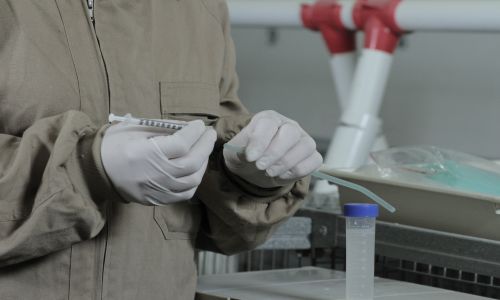
At company cuniculture course
We hold technical training courses at our clients’ facilities.
By using the on-line video course and holding practical classes, we will design the type of training courses for each client or group of rabbit farmers, with tailor-made contents.
Through our customised training courses you will achieve:
- An overall outlook on working at a rabbit farm.
- Practical knowledge about the work and processes.
- Organisation of tasks to optimise resources.
- Training for the logistics organisation for meat production.
- Data management. Objectives. Production costs.
- Knowledge about obtaining semen doses and other complementary tasks.
Do not worry about anything, we'll call you shortly!
Enter your name, phone and email, and an expert will contact you in a few moments.
He leído y acepto la Política de privacidad
In Company rabbit farming course programme
Rabbit Farm Management
- Management in bands / organisation of farm work.
- Managing re-breeding of future breeding does.
- Receiving animals from selection farms.
- Preparing females for artificial insemination.
- Checking does and hormone treatment.
- Artificial insemination.
- Palpation for pregnancy testing.
- Preparing and caring for kindling.
- Preparing and caring for nesting.
- Controlled lactation.
- Weaning
- Managing fattening / sales to slaughter houses and sale of animals for further life.
Other farm tasks
- Injecting: subcutaneous, intramuscular…
- Prevention of mouth parasites.
- Applying sprays to legs.
- Cleaning: sweeping, cleaning cages, nests…
- Disinfection: using different types of machines.
- Receiving visits at your farm.
- Sexing young animals.
Insemination techniques
- Procedure for handling bucks
- Health programme
- Checking animals.
- Bio-safety Regulations.
- Semen handling procedure
- Extracting semen.
- Diluting and macroscopic inspection of ejaculate.
- Microscopic inspection, preparing the pool and sperm count.
- Bottling semen doses.
Pathology, prophylaxis and therapy
- Diagnosis
- Autopsies
- Sample taking for laboratories. Laboratory diagnosis
- Medical and hygiene prophylaxis
- Methods of administration
Technical / Economic Management
- Data compilation on individual doe and buck datasheets
- Band control sheets / lactation and fattening period control
- Management of specific meat farm software
- Production indicators: Units of measure – control frequency – reference value. Production costs
- Individual objectives. Production control. Corrective / preventive measures.
Genetic improvement
- Importance of genetic improvement
- Differences between genetic lines: meat lines and breeding doe lines. Heterosis.
- Three-way cross-breeding.
- Selecting breeding does.
- Managing data from cross-breeding, weighing individuals in meat lines. Software for genetic selection.
Bio-safety
- Preventive measures to minimise health risks in:
- Farms
- Animals
- Food and water
- Personnel and health rules
- Materials
- Medication
- Biocides and phytosanitary products
- Waste management
- Cleaning and disinfection
Managing nutrition
- Distributing food
- Fodder
- Rationing
- Growth curves
- Feeding programmes
The training sessions for in-person rabbit farming courses are delivered by Vets or Agricultural Engineers specialising in each subject, whereas the rest of the sessions are delivered by Granja Jordán staff at your facilities.
